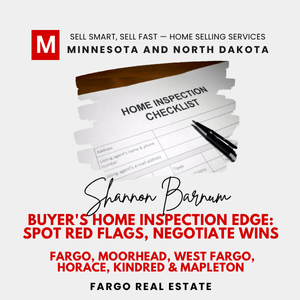Ultimate Guide to Home Inspections for Buyers: Spot Issues, Negotiate Smart, and Buy Confidently

Ready to buy smarter? Discover Shannon Barnum’s “Ultimate Guide to Home Inspections for Buyers: Spot Issues, Negotiate Smart, and Buy Confidently” – your roadmap to uncovering hidden problems, mastering negotiations, and securing your dream home in Fargo, Moorhead, West Fargo, Horace, Kindred & Mapleton. From inspection checklists to buyer hacks, get the edge today!
Buying your home doesn’t have to be a guessing game. As a buyer, mastering the home inspection process can turn potential red flags into informed decisions. Whether you’re navigating seasonal weather challenges or a competitive real estate market, a thorough approach to home inspections for buyers ensures you avoid costly surprises and land the right property. At Home Search, we’ve empowered countless buyers to sidestep pitfalls, turning inspections into your strongest leverage. In this comprehensive guide, we’ll explore strategies for buyer’s inspections, common issues, and expert tips to close with confidence.
Why Home Inspections Matter for Buyers in the Market
In a fast-paced housing market, where sellers are polished and prepared, a detailed buyer’s home inspection during the purchasing process isn’t just optional—it’s your safeguard. Here’s the key insight: buyers who prioritize comprehensive inspections negotiate 10-20% better terms, based on local real estate trends.
The Cost-Benefit of Thorough Inspections
Investing in a buyer’s home inspection after offer acceptance is a small price (typically $400-$600) for peace of mind. It reveals underlying problems early, empowering you to negotiate repairs, credits, or even walk away. Disclose nothing—use the report as your bargaining tool to protect your investment.
When to Schedule Your Buyer’s Inspection
Strike while the iron is hot. Book your home inspection for buyers within the contingency window (usually 7-10 days post-offer). This gives you time to review findings without rushing into closing.
Common Home Inspection Issues for Buyers and How to Spot Them
Every home has quirks, especially in areas battered by harsh winters. By knowing the most common home inspection red flags for buyers, you can anticipate negotiations and avoid overpaying. Let’s unpack the biggest watch-outs.
Structural Integrity: Foundations and Framing
Freeze-thaw cycles and expansive soils frequently cause foundation cracks in home inspections for buyers. Look for signs of settling, like uneven floors or sticking doors—issues that could cost thousands in fixes down the line.
Red Flags and Next Steps for Foundation Concerns
- Probe for cracks: Check for active movement or water intrusion.
- Evaluate drainage: Poor grading around the home can exacerbate problems—insist on a second opinion if needed.
- Pro Tip: Request a geotechnical assessment to quantify risks before committing.
Roofing and Exterior: Battling the Weather
Blizzards and gusts often reveal roof leaks during home inspections for buyers. Scrutinize shingle condition, attic staining, and gutter functionality for long-term durability.
Strategies to Assess Your Roof’s Future
Bring a roofing specialist for a walkthrough if the report flags concerns. Push for seller repairs on flashing or ventilation to dodge ice dam disasters. Gather estimates to fuel your negotiation.
HVAC and Plumbing: Longevity Checks
Aging systems can drain your wallet. HVAC deficiencies in buyer home inspections might include undersized units struggling against sub-zero temps.
Key Upgrades to Demand
- Verify recent servicing and efficiency ratings.
- For plumbing, test for water pressure inconsistencies in home buyer inspections or hidden leaks—common in older homes.
- Seek energy-efficient options; they could save on utilities and qualify for incentives.
Electrical and Safety: Code Compliance
Outdated wiring like aluminum branches poses fire risks. Electrical issues in buyer’s inspections often involve missing GFCIs or inadequate grounding.
Critical Safety Scans
Ensure carbon monoxide detectors are present and test outlets for polarity. If non-compliant, negotiate updates—your safety isn’t optional.
Strategies for Handling Sellers During the Inspection Phase
Inspections can stir seller defensiveness, but treating it as due diligence keeps things civil. Here’s how buyers maintain momentum.
Communicate Professionally from the Start
Present your inspection request clearly in the offer. Once results arrive, lead with facts: “The report highlights these items—let’s collaborate on solutions.”
Negotiating Repairs Without Stalling the Deal
Triage findings: Demand fixes for safety hazards, request credits for major systems (e.g., HVAC), and concede on minor cosmetics. Market data shows informed buyers secure 5-10% in concessions.
When to Walk Away from a Property
If sellers dismiss critical issues or lowball responses, trust your gut. Multiple listings mean options—better to exit early than regret later.
Maximizing Your Real Estate Professional’s Expertise
Your agent is more than a house hunter; they’re your inspection navigator. At Home Search, our experts demystify reports and sharpen your strategy.
Leveraging Your Agent for Inspection Guidance
Rely on your real estate professional to connect you with certified inspectors versed in local nuisances, like basement flooding. They’ll flag sneaky clauses in seller disclosures.
Collaborative Strategies with Your Realtor
- Joint reviews: Walk through findings together to prioritize asks.
- Negotiation tactics: Draw on their comps to press for fair concessions.
- Follow-up huddles align your next moves, converting insights into stronger offers.
Partnering this way helps buyers close 15% smoother and snag better deals, per MLS insights.
Conclusion: Secure Your Purchase with Inspection Savvy
With this guide in hand, you’re equipped to inspect like a pro—not just buy a house, but invest in a solid future. A smart home inspection strategy for buyers is your shield in a market full of unknowns. Eager to tour? Reach out to Home Search for customized buyer consultations and trusted inspector referrals. Let’s turn your vision into keys in hand.
FAQ: Home Inspections for Buyers
What is a buyer’s home inspection, and why should you get one?
A buyer’s home inspection is a professional evaluation commissioned after your offer is accepted, typically within a contingency period. It uncovers defects like roof wear or plumbing flaws, enabling informed negotiations. It’s crucial for avoiding post-closing regrets and saving thousands in unexpected repairs.
How much does a home inspection cost for buyers?
Plan for $400-$700 for a standard home inspection for buyers, varying by home size and extras like mold or termite checks. Compared to the $10,000+ in potential fixes, it’s an essential upfront spend.
What are the most common home inspection issues for buyers?
Frequent finds include foundation shifts from freeze-thaw, wind-damaged roofs, outdated HVAC for extreme cold, and elevated radon levels. Spotting these early arms you for effective bargaining.
How do I prepare for my home inspection as a buyer?
Arrive on time, take notes during the walkthrough, and ask questions freely. Bring a checklist for systems like electrical and don’t hesitate to request attic or crawlspace access—knowledge is power.
What if the home inspection uncovers major problems?
Breathe: Consult your agent to craft a response. Propose seller repairs, price reductions, or closing credits backed by contractor bids. For instance, seek a $5,000 concession for foundation work. If the seller balks, activate your contingency to exit gracefully.
Can I attend my own home inspection?
Absolutely—it’s your right and often enlightening. Coordinate with the inspector for a full tour, but keep it observational to avoid bias. Your agent’s presence adds value without overwhelming the process.
How do I handle radon or mold findings in a home inspection?
These are deal influencers: For radon, demand mitigation ($800-$1,500) or credits. Mold requires professional remediation—insist on verification post-fix. Full disclosure from sellers is key; use it to negotiate.
What’s the best way to negotiate after a home inspection as a buyer?
Be strategic: Fix safety musts (e.g., wiring), credit majors (e.g., roof), and flex on minors. Arm yourself with agent-provided estimates and comps—e.g., “This HVAC upgrade aligns with neighborhood standards.” Focus on mutual wins to seal the deal.
How can my real estate professional help during the home inspection process?
Your agent handpicks reliable inspectors, decodes jargon-filled reports, and leads negotiations with data-driven counters. They also scout alternatives if needed, maximizing your leverage. Pro tip: Debrief immediately for timely action.
Are there strategies to buy a home “as-is” despite inspection concerns?
Possible for fixer-uppers: Waive contingencies for investor deals, but price 5-10% under market and budget for renos. Still, get a basic inspection for surprises—it’s rarely truly “as-is” without risks.
How long does a typical home inspection take for buyers?
Expect 2-4 hours for a home inspection for buyers, plus extras for add-ons like septic or well tests. Morning slots work best to wrap before evening bids.
What questions should I ask during a buyer’s home inspection?
Inquire about repair costs, system ages, and maintenance history. Probe: “How urgent is this crack?” or “What’s the roof’s remaining life?” Document answers for your negotiation arsenal.For personalized guidance, connect with the Home Search team—we’re dedicated to crafting your buying success.
Homes For Sale
IDX MLS IDX Listing Disclosure © 2025
The data relating to real estate for sale on this web site comes in part from the Broker Reciprocity SM Program of the Regional Multiple Listing Service of Minnesota, Inc. The information provided is deemed reliable but not guaranteed. Properties subject to prior sale, change or withdrawal. ©2024 Regional Multiple Listing Service of Minnesota, Inc All rights reserved.
Real Estate Home Services
Looking for expert real estate guidance in Minnesota? Explore our services tailored for buyers, sellers, and relocators.
👉 Visit the Real Estate Home Services Hub
- Home Selling Services – Market prep, pricing guidance, and expert staging.
- Home Buying Services – From property search to final walkthrough, we’re with you.
- Relocation Services – Moving to Minnesota? We make it seamless.
- New Developments – Explore new construction options across the state.
- Transparent Pricing Promise – No hidden fees. Just results.
About the Author
Jim Christl, Broker/Owner at Modern Market REALTORS®, brings over 20 years of experience navigating the Fargo-Moorhead real estate landscape.
Jim has spent the last two decades guiding buyers and sellers through every market cycle—from first-time homes to luxury estates and everything in between. His in-depth knowledge of local trends, combined with a passion for clear, actionable insights, makes him a trusted resource for real estate strategies, market analysis, and expert commentary. When he isn’t closing deals, Jim enjoys mentoring new agents and writing about the latest industry developments to help homeowners make informed decisions.





